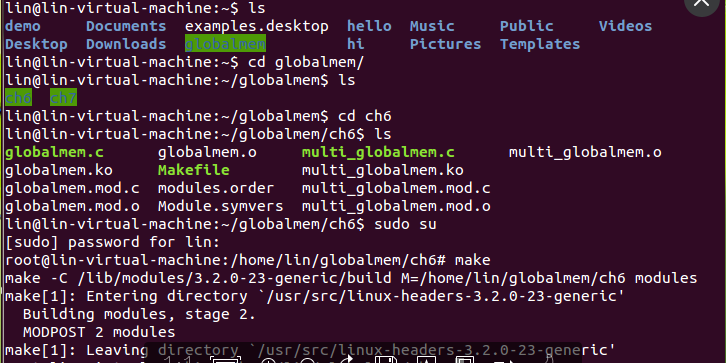例子就直接使用宋宝华的书上例子。

/* * a simple char device driver: globalmem without mutex * * Copyright (C) 2014 Barry Song (baohua@kernel.org) * * Licensed under GPLv2 or later. */ #include <linux/module.h> #include <linux/fs.h> #include <linux/init.h> #include <linux/cdev.h> #include <linux/slab.h> #include <linux/uaccess.h> #define GLOBALMEM_SIZE 0x1000 #define MEM_CLEAR 0x1 #define GLOBALMEM_MAJOR 230 static int globalmem_major = GLOBALMEM_MAJOR; module_param(globalmem_major, int, S_IRUGO); struct globalmem_dev { struct cdev cdev; unsigned char mem[GLOBALMEM_SIZE]; }; struct globalmem_dev *globalmem_devp; static int globalmem_open(struct inode *inode, struct file *filp) { filp->private_data = globalmem_devp; return 0; } static int globalmem_release(struct inode *inode, struct file *filp) { return 0; } static long globalmem_ioctl(struct file *filp, unsigned int cmd, unsigned long arg) { struct globalmem_dev *dev = filp->private_data; switch (cmd) { case MEM_CLEAR: memset(dev->mem, 0, GLOBALMEM_SIZE); printk(KERN_INFO "globalmem is set to zero "); break; default: return -EINVAL; } return 0; } static ssize_t globalmem_read(struct file *filp, char __user * buf, size_t size, loff_t * ppos) { unsigned long p = *ppos; unsigned int count = size; int ret = 0; struct globalmem_dev *dev = filp->private_data; if (p >= GLOBALMEM_SIZE) return 0; if (count > GLOBALMEM_SIZE - p) count = GLOBALMEM_SIZE - p; if (copy_to_user(buf, dev->mem + p, count)) { ret = -EFAULT; } else { *ppos += count; ret = count; printk(KERN_INFO "read %u bytes(s) from %lu ", count, p); } return ret; } static ssize_t globalmem_write(struct file *filp, const char __user * buf, size_t size, loff_t * ppos) { unsigned long p = *ppos; unsigned int count = size; int ret = 0; struct globalmem_dev *dev = filp->private_data; if (p >= GLOBALMEM_SIZE) return 0; if (count > GLOBALMEM_SIZE - p) count = GLOBALMEM_SIZE - p; if (copy_from_user(dev->mem + p, buf, count)) ret = -EFAULT; else { *ppos += count; ret = count; printk(KERN_INFO "written %u bytes(s) from %lu ", count, p); } return ret; } static loff_t globalmem_llseek(struct file *filp, loff_t offset, int orig) { loff_t ret = 0; switch (orig) { case 0: if (offset < 0) { ret = -EINVAL; break; } if ((unsigned int)offset > GLOBALMEM_SIZE) { ret = -EINVAL; break; } filp->f_pos = (unsigned int)offset; ret = filp->f_pos; break; case 1: if ((filp->f_pos + offset) > GLOBALMEM_SIZE) { ret = -EINVAL; break; } if ((filp->f_pos + offset) < 0) { ret = -EINVAL; break; } filp->f_pos += offset; ret = filp->f_pos; break; default: ret = -EINVAL; break; } return ret; } static const struct file_operations globalmem_fops = { .owner = THIS_MODULE, .llseek = globalmem_llseek, .read = globalmem_read, .write = globalmem_write, .unlocked_ioctl = globalmem_ioctl, .open = globalmem_open, .release = globalmem_release, }; static void globalmem_setup_cdev(struct globalmem_dev *dev, int index) { int err, devno = MKDEV(globalmem_major, index); cdev_init(&dev->cdev, &globalmem_fops); dev->cdev.owner = THIS_MODULE; err = cdev_add(&dev->cdev, devno, 1); if (err) printk(KERN_NOTICE "Error %d adding globalmem%d", err, index); } static int __init globalmem_init(void) { int ret; dev_t devno = MKDEV(globalmem_major, 0); if (globalmem_major) ret = register_chrdev_region(devno, 1, "globalmem"); else { ret = alloc_chrdev_region(&devno, 0, 1, "globalmem"); globalmem_major = MAJOR(devno); } if (ret < 0) return ret; globalmem_devp = kzalloc(sizeof(struct globalmem_dev), GFP_KERNEL); if (!globalmem_devp) { ret = -ENOMEM; goto fail_malloc; } globalmem_setup_cdev(globalmem_devp, 0); return 0; fail_malloc: unregister_chrdev_region(devno, 1); return ret; } module_init(globalmem_init); static void __exit globalmem_exit(void) { cdev_del(&globalmem_devp->cdev); kfree(globalmem_devp); unregister_chrdev_region(MKDEV(globalmem_major, 0), 1); } module_exit(globalmem_exit); MODULE_AUTHOR("Barry Song <baohua@kernel.org>"); MODULE_LICENSE("GPL v2");





